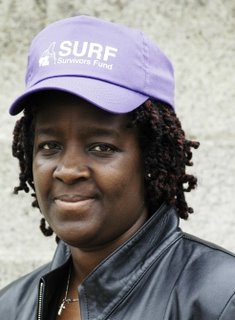Survivors Fund (SURF)
Between April and June 1994, more than 1,000,000 Tutsis and moderate Hutus were killed in the Rwandan genocide, the most intense period of killing in modern history. Eleven years on, survivors of genocide are struggling to piece together their shattered lives and cope with the many legacies of genocide.
I am one of the lucky ones. Despite losing most of my family in the genocide, I did not suffer the trauma of rape and abandonment that befell many Rwandan women. It is this vulnerable group, in particular those raped, deliberately infected with HIV and who are now dying from AIDS, that SURF has been focused on helping over the last year. Fortunately, through the assistance of the Department for International Development (DFID) we are now supporting 2,500 HIV+ women survivors with antiretroviral treatment.
This is the essence of SURF’s work, to rebuild a sense of self and trust in humanity for these people, destroyed by genocide through the infliction of excruciating physical pain and terrifying mental abuse. Since helping to set up SURF, nearly nine years now, we have helped survivors deal with and recover from the tragedies of 1994, supporting a wide range of services for victims in Rwanda, and assisting survivors in the UK. Funded by a variety of organisations and individuals, we act as a channel to distribute financial assistance through grassroots partners to bring hope, safety, and a decent standard of living for survivors.
Films like Shooting Dogs are playing an important role in raising awareness of the events of 1994. The release of the film comes at the right time for survivors, many who cannot help feeling that their stories had been long forgotten by the world.
As the film portrays, the events of 1994 were brutal with genocidaires actively involving the entire population. But what it is unable to showcase is the plight of survivors today. It is not a sad ending, neither a happy one, as the conclusion is still to be determined. Men were targeted first in the killings, so survivors are mostly women and children. Many women were gang raped by the interahamwe (those who killed together), who knowing that they were HIV+ used sexual violence so survivors would live only to die slowly from AIDS.
The reality for women survivors in Rwanda is an ongoing concern, as they must live side-by-side with men who raped them and killed their families, as the perpetrators of the genocide are being released back into the community. The country no longer has the resource to continue to keep these men inc
 arcerated, and so by admitting guilt at a local gacaca (community-based) trial they are now free.
arcerated, and so by admitting guilt at a local gacaca (community-based) trial they are now free.Survivors have received no justice - they now face harassment and intimidation from these very people. There is no simple way of redressing the balance, but by securing access to antiretroviral treatment then at least women survivors can look forward again to a future. Meanwhile SURF in 2006 will raise the profile of rape as a weapon of war, and call for action to stop the verbal and physical abuse, and in recent cases, murder, of survivors for giving testimony to gacaca courts.
For more information, please visit: www.survivors-fund.org.uk
-Mary Kayitesi Blewitt


0 Comments:
Post a Comment
<< Home